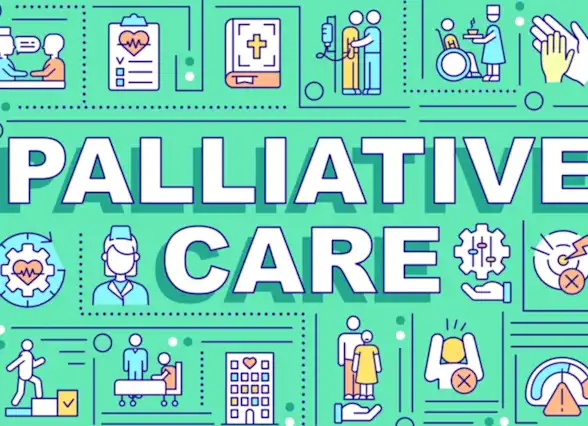Caregiving Challenges, Palliative Care
Palliative care is NOT hospice, even though the terms are often used together. Understanding how palliative care differs from hospice is reassuring.
Get insurance benefits, legal documents, and medical records in one place

Helpful Highlights
Palliative care is NOT hospice. Hospice is just one possible outcome of palliative care.
Palliative care focuses on quality of life through symptom management and does not seek to cure life-limiting illness(es) or "fix" the underlying problem(s).
Healthcare professionals specializing in palliative care are quality-of-life experts with a wealth of knowledge and creative solutions.
You might see 'palliative care' and 'hospice' used together or interchangeably, and may even think they're the same thing, but they are not, and the differences are substantial. Knowing those differences may matter to you and your loved one.
Medicare and Medicare Advantage plans have coverage for palliative care. Both Medicare and Medicare Advantage cover inpatient care, outpatient care, medication management, and mental health counseling that form palliative care services.
So... Palliative care - What is it?
Foremost, palliative care is NOT hospice. However, like hospice, it does NOT mean giving up.
There is no set life expectancy and palliative care can occur for years (unlike hospice, which requires a diagnosis of 6 months or less).
The priority is enhanced quality of life. The focus of palliative care is three-fold:
Managing symptoms to prevent hospitalizations
Managing symptoms to promote your loved one's enjoyment of life
Understanding medical choices and ensuring ongoing and future medical care is planned according to your loved one's desires
Palliative care can be implemented at any stage of a serious, life-limiting illness (such as heart failure, COPD, or cancer), including soon after diagnosis. It is often implemented at moderate to advanced stages, however.
It does not require that curative treatment stop. Your loved one may continue to receive treatment intended to cure the serious illness.
It is not any one service (like hospice is). Palliative care comprises a collection of services that come together with the aim of improving quality of life.
Care is provided by a team of professionals who are all experts or certified in palliative care. Care is typically overseen by a nurse practitioner, though also includes a physician and social worker. Your loved one's primary provider may be involved, and family caregivers are also included on the palliative care team!
Services are provided wherever the person resides: home, assisted living, and even some hospitals have inpatient palliative care units (in the case of hospital admission).
Over time, if the palliative care team believes any ongoing curative treatment is no longer beneficial, stopping curative treatment will be discussed.
As the serious illness approaches end-stage, palliative care could be transitioned to hospice care upon diagnosis of 6 months or less of life remaining. Hospice care is a choice made by your loved one and not automatic.
Also see our Guide on Caregiver's Challenge: Hospice.
No content in this app, regardless of date, should ever be used as a substitute for direct medical advice from your doctor or other qualified clinician.
Get more support and guidance on insurance benefits, medical records and legal forms.
Helpful brings together your insurance benefits, legal documents, and medical records in one personalized place — so you always know what you have, and never have to search again.

Technology for Health Tasks. Mental Health for the Tough Stuff.
Helpful connects your medical records, insurance, and caregiving tasks automatically. And when you need more than logistics, a therapist is here to guide you.
In-Network and Covered
For Individuals, Couples and Families
HIPAA Compliant, Data Stays Private


Healthcare Tasks Simplified

From syncing records to spotting drug interactions, Helpful does the heavy lifting, turning complex health info into clear tasks and showing you benefits you can actually use, giving you clarity and control over your care.

In-Network Mental Health

Our licensed therapists are here to support you and your loved ones through stress, burnout, and life’s hardest moments, with an inclusive, compassionate approach that works with most insurance plans.

Create Legal Documents

Plan ahead by creating will, trusts, advance directives and more, that ensure your wishes are honored in the event you can’t speak for yourself -with Helpful guiding you every step of the way.